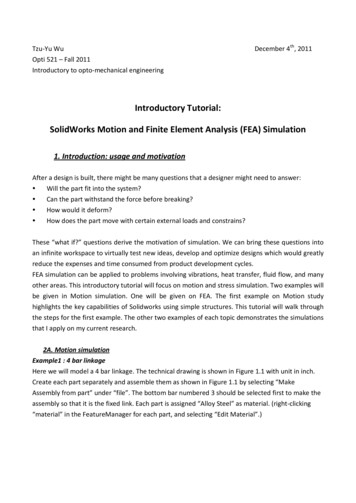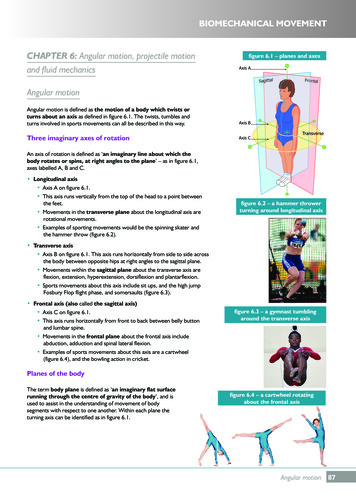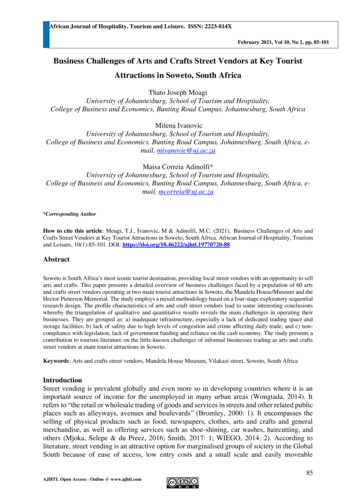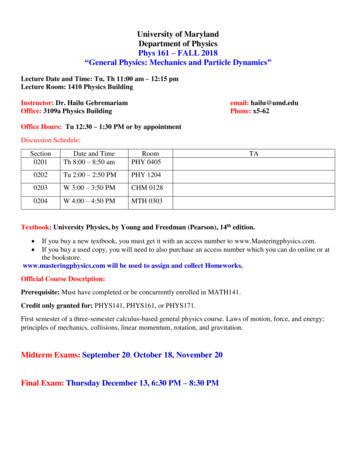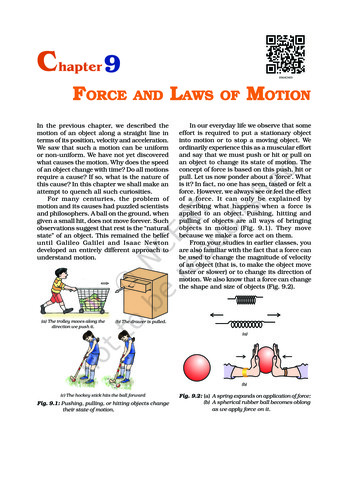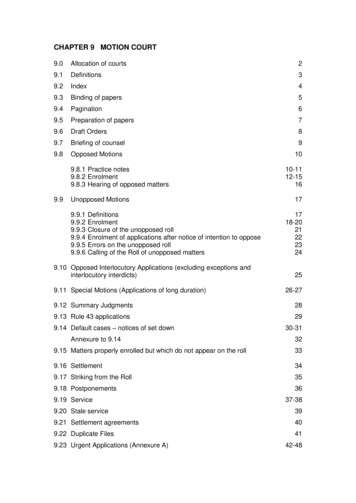
Transcription
CHAPTER 9 MOTION COURT9.0Allocation of courts29.1Definitions39.2Index49.3Binding of papers59.4Pagination69.5Preparation of papers79.6Draft Orders89.7Briefing of counsel99.8Opposed Motions109.8.1 Practice notes9.8.2 Enrolment9.8.3 Hearing of opposed matters9.9Unopposed rolmentClosure of the unopposed rollEnrolment of applications after notice of intention to opposeErrors on the unopposed rollCalling of the Roll of unopposed matters9.10 Opposed Interlocutory Applications (excluding exceptions andinterlocutory interdicts)9.11 Special Motions (Applications of long duration)10-1112-1516171718-20212223242526-279.12 Summary Judgments289.13 Rule 43 applications299.14 Default cases – notices of set downAnnexure to 9.1430-31329.15 Matters properly enrolled but which do not appear on the roll339.16 Settlement349.17 Striking from the Roll359.18 Postponements369.19 Service37-389.20 Stale service399.21 Settlement agreements409.22 Duplicate Files419.23 Urgent Applications (Annexure A)42-48
9.0 ALLOCATION OF COURTS1.During Court Term:1.1 Unopposed Motion CourtThree courts will sit on each day of the week.1.2 Opposed Motion CourtFour courts will sit on each day of the week.1.3 Urgent Motion CourtOne court will sit from 16h00 on the Friday preceding themotion court week and will terminate its sitting on thefollowing Friday at 16h00.1.4 Special Motion CourtOne court will sit on each day of the week.1.5 The Judge President or the Deputy Judge President may, interms of the term roll or, where it is required during the courtterm, increase or decrease the number of courts referred to in1.1, 1.2, 1.3 and 1.4.2.During Court Recess:2.1 Unopposed Motion CourtTwo courts will sit from Tuesday to Friday of each week, savefor the weeks of Christmas and New Year.2.2 Opposed Motion CourtNo opposed matters will be heard during court recess.2.3 Urgent Motion CourtOne court will sit each day of the week.The Judge President or Deputy Judge President may in termsof the recess duty roll or, where it is required during recess,the senior judge on duty, may increase or decrease thenumber of courts referred to in 2.1, 2.2 and 2.3.2015/10/122
9.1 DEFINITIONSFor purposes of this chapter, unless the context otherwise indicates, “deliver”2015/10/12-shall mean serve copies on all parties and file theoriginal with the Registrar;3
9.2 INDEX1.Before an application is made to the Registrar for the allocation of adate for the hearing of any application, the applicant must deliver aconsolidated index of all documentation before the Court for thedetermination of the application. In addition, each volume of theapplication papers must be separately indexed.2.The indices should briefly describe each affidavit and annexure asa separate item.3.All orders of court throughout the matter must be collated inchronological order and affixed to the left inner cover of the courtfile, the most recent court order being uppermost.4.This practice is equally applicable to opposed and unopposedapplications.2015/10/124
9.3 BINDING OF PAPERS1.Prior to the set down of the application the applicant must ensurethat all the documentation before the Court for the determination ofthe application is properly bound.2.In binding the application, care must be taken to ensure that themethod of binding does not hinder the turning of papers.3.The documentation should not be bound in volumes of more than100 pages each. This limit may be exceeded so as to obviate theseparation of parts of an affidavit or document.4.This practice is equally applicable to opposed and unopposedapplications.2015/10/125
9.4 PAGINATION1.The applicant must paginate the notice of motion, founding affidavitand annexures thereto; the replying affidavit, if any, and annexuresthereto, prior to serving the documents on the other party.2.The respondent must likewise paginate the answering affidavit andannexures thereto prior to serving the documents on the otherparty.3.The respondent must commence pagination of the answeringaffidavit and annexures thereto by utilising the next chronologicalnumber following the last number utilised by the applicant. Theapplicant must commence pagination of the replying affidavit andannexures thereto by utilising the next chronological numberfollowing the last number utilised by the respondent.4.Where there are multiple respondents represented by differentattorneys, each such respondent is released from the obligationreferred to in paragraphs 2 and 3 above. In that event, theobligation to paginate all the affidavits is on the applicant.5.Additional documents generated during the application (eg returnsof service, reports, etc) must be indexed, paginated and placed inan „Additional Documents Bundle‟.6.Notwithstanding paragraphs 2 and 3 above, the applicant mustensure that prior to the hearing of the application it is properlypaginated. In the event that the respondent fails to comply withparagraph 2 above, the applicant may seek a punitive cost orderagainst the respondent in respect of the pagination of theanswering affidavit and annexures.7.This practice is equally applicable to opposed and unopposedapplications.2015/10/126
9.5 PREPARATION OF PAPERS1.The original application, the original return of service and otheroriginal documents comprising the application must be contained inthe court file. Certified copies of documents may be used save thatwhen a matter is heard counsel appearing in the matter will berequired to have the original documents on hand and to providethese to the judge upon request.2.If a document or documents attached to the founding or replyingaffidavit are 2.1 in manuscript; and2.2 not readily legible,the applicant shall ensure that typed and legible copies of thedocument or documents are provided.3.The respondent bears the obligation referred to in the previoussubparagraph in respect of documents attached to the answeringaffidavit.4.The relevant application is to be placed on top of all other papers inthe court file. The papers which are irrelevant to the issue which isthe subject matter of the application are to be separated from thosethat are not.2015/10/127
9.6 DRAFT ORDERS1.All applications, whether opposed or unopposed, must beaccompanied by a draft order reflecting the precise terms of therelief sought. Such draft order must be filed with the Registrar atthe time of issuing of the application.2.Draft orders must be presented in duplicate to the Court in allmatters where a draft order is sought to be made an order of court.Handwritten draft orders are not acceptable. A place must be lefton the draft order to insert the name of the presiding judge and ofapplicant‟s counsel or legal representative and his/her cell-phoneor telephone number.2015/10/128
9.7 BRIEFING OF COUNSEL1.Legal representatives must ensure that counsel are briefedtimeously to enable counsel to file practice notes and heads ofargument and to generally comply with the requirements of thepractice manual in respect of the motion court.2.The fact that counsel has not been briefed timeously will normallynot be accepted as a reasonable explanation for the failure ofcounsel to comply with the requirements of the practice manual.2015/10/129
9.8 OPPOSED MOTIONS9.8.1 Practice Notes1.The heads of argument of each party must be accompanied by apractice note (see para 9.8.2).2.The practice note shall set out –2.1 the names of the parties and the case number;2.2 the names, telephone numbers (including cell-phonenumbers) and email addresses of all counsel and attorneys inthe application (if known);2.3 the nature of the application and relief sought;2.4 a succinct summary of the main issues to be determined inthe application. Each main issue should be stated separately;2.5 a summary of the contentions in respect of the main issuesand the authorities relied on;2.6 an estimate of the probable duration of the motion;2.7 whether matter is urgent and, if so, motivation for the urgency;2.8 whether the papers need to be read and, if so, which partsare relevant for the determination of the application; and2.9 where counsel is briefed in more than one opposedapplication, the names and case numbers of the otherapplications in which counsel appears.3A practice note must also be filed on each occasion that theapplication appears on the opposed roll.4Where an opposed application is postponed or is reinstated forhearing, a new practice note must be delivered not later than13h00, fifteen (15) days preceding the first day of the week inwhich the matter will be heard. An additional copy of the practicenote must be hand-delivered or sent by email to the clerk of thesenior judge presiding in the motion court during such week.2015/10/1210
52015/10/12If a practice note is not delivered as required in terms of thisparagraph, or does not contain the prescribed information, theapplication shall not be allocated for hearing.11
9.8.2Enrolment1.2.3.4.2015/10/12A party to an opposed motion may apply to the Registrar to allocatea date for the hearing of that application in terms of Rule 6(5)(f) ofthe Uniform Rules of Court only if (a)the papers have been properly secured, indexed andpaginated; and(b)heads of argument accompanied by a practice note from eachparty has been delivered.The procedure to enrol an opposed application commences when aconsolidated index is delivered.(a)The applicant shall deliver a consolidated index within ten (10)days from the service of the applicant‟s replying affidavit orlast affidavit that can permissibly be filed.(b)Should the applicant not timeously deliver the consolidatedindex, the respondent may do so.(c)The consolidated index must prominently indicate on the frontpage the date when and in what manner it was served on theopposing party.(a)The applicant shall deliver heads of argument and a practicenote within fifteen (15) days from the date of service of theconsolidated index; and(b)the respondent shall deliver heads of argument and apractice note within fifteen (15) days from the date of receiptof the applicant‟s heads of argument.(c)If the applicant fails to deliver the heads of argument andpractice note within the prescribed period, the respondentshall deliver its heads of argument and practice note.(d)The Registrar must record on the court file the dates of filingof the parties‟ heads of argument and practice notes.(e)The heads of argument and practice notes may be served inaccordance with Rule 4A of the Uniform Rules but filing withthe Registrar shall not be effected by way of facsimile orelectronic mail.Where a party fails to deliver heads of argument and/or a practicenote within the stipulated period, the complying party may enrol theapplication for hearing provided that 12
(a)a letter is served upon the defaulting party in accordance withRule 4A of the uniform rules requiring it to deliver the heads ofargument and/or practice note; and(b)a letter is sent to the Deputy Judge President (or in hisabsence the senior motion court judge) requesting that adirective be issued to compel the defaulting party to deliverthe heads of argument and/or practice note. The letter mustbe hand-delivered or sent by email to the relevant judge‟sclerk, and also served on the defaulting party in accordancewith Rule 4A of the uniform rules.5.The failure to timeously serve and file heads of argument shall notconstitute a ground for postponement of an application.6.Additional or supplementary heads of argument may only be filedby a party with the leave of the Court.7.When preparing heads of argument practitioners are reminded ofthe dicta in Catheram Car Sales & Coachworks Limited v BirkinCars (Pty) Ltd and Another 1998 (3) SA 938 (SCA) at 955B-G andEnsign-Bickford (SA) (Pty) Ltd and Others v AE&CI Explosives &Chemicals Ltd 1999 (1) SA 70 (SCA) 84H-85B.8.The heads of argument shall include a list of the authorities to bequoted in support of the argument. Copies of the authorities or anystatutory enactment relied upon shall accompany the heads ofargument in a separate volume.9.The heads of argument of the applicant shall be accompanied by achronology table, duly cross-referenced, without argument. If therespondent disputes the correctness of the chronology table in amaterial respect, the respondent‟s heads of argument shall beaccompanied by the respondent‟s version of the chronology table.10. The Registrar will make available a secure location („the location‟)under the supervision of a person („the supervisor‟) where aregister of matters enrolled on the opposed motion roll will be kept.11. In the location the Registrar shall make available suitable spacewhere the files of each opposed motion court week will be kept. Adesignated room will be indicated as the location.2015/10/1213
12. The Registrar will prepare and at all times have available in thelocation a blank register for each court week. The blank register willbe in accordance with Annexure „A‟ attached hereto.13. Any person seeking to enrol a matter on the opposed motion courtroll shall take the file, ready for hearing, properly paginated andindexed, together with the heads of argument and practice notesand, where applicable, the letters referred to in paragraph 4 aboveand proof that same have been served, to the location, enter theparticulars as set out hereunder and leave the file in the location.14. The person enrolling the matter shall do so by entering in the nextavailable space, for a particular date, on the register, the casenumber, the parties‟ names, the nature of the application, the nameof the parties‟ attorneys, the name of the person enrolling thematter and his or her contact details. The person shall file in thecourt file a notice of set down stamped by the supervisor.15. The supervisor shall keep the respective files for each motion courtweek separately. The files shall be kept in the order that theyappear on the register.16. No more than fifty (50) applications may be enrolled for any courtweek.17. Once a matter is enrolled, 18.1no party may, without the leave of the Court, file any furtherdocuments other than a notice of removal, a notice ofwithdrawal, a notice of postponement or an official documentor report.18.2the Registrar shall afford access to the court file and permitthe filing of documents where an application is required to bebrought in terms of ss 4 and 5 of the Prevention of IllegalEviction from and Unlawful Occupation of Land Act, No 19 of1998 (PIE).18. When a matter is removed from the Roll by notice, the supervisorshall stamp the notice of removal, file the notice in the file andreturn the file to the general office for filing. The supervisor shallalso delete the entry pertaining to that matter from the register andsign his or her name next to the deletion with the date of thedeletion. Other than this no entry may be removed from the registerof opposed motions and no file may be removed from the secure2015/10/1214
location for any purpose other than to take the files to the seniorjudge in the opposed motion court.19. It shall be the responsibility of the Registrar to prepare a court rollfrom the register for the opposed motions for each week.20. Where an opposed application is to be set down for hearing duringthe first or second week of any term, the parties shall comply withthe requirements set out in paragraphs 1, 2, 3, 4 and 14 by notlater than the first day of the last week of the preceding term.21. The files in all opposed applications that are to be heard during thefirst and second weeks of any term shall be delivered by theRegistrar to the senior judge or judges concerned, for allocation onthe first day of the last week of the preceding term.22. Save for applications that are of an urgent nature, no opposedapplications must be set down for hearing during the last week ofterm.23. If an application is not to proceed on the date allocated, the partiesmust immediately notify the Registrar.2015/10/1215
9.8.3 Hearing of opposed matters1.All matters will be enrolled for the first day of the week in which thematters are to be heard.2.The senior judge will have all files at least fifteen clear court daysbefore the first day of the week during which the matters are to beheard and will allocate all matters to judges for hearing at least tencourt days in advance.3.The senior judge will prepare a roll reflecting the names of thejudges to whom the matters have been allocated for hearing, whichwill be distributed to the Registrar and the professions.4.Each judge will also prepare his or her own roll for the week, whichwill be distributed to the Registrar and the professions.5.Judges will, as far as possible, accommodate counsel and legalpractitioners to hear matters on specific dates.6.Judges may, in their discretion, direct one or more of the parties tofile additional or supplementary heads of argument.7.As soon as a matter becomes settled or the parties agree topostpone, the judge presiding must immediately be informed of thatfact.8.No opposed application may be postponed to another opposedmotion court date unless a new date has been obtained from theRegistrar. A new date for hearing must be applied for in terms ofparagraph 9.8.2 supra.2015/10/1216
9.9 UNOPPOSED MOTIONS9.9.1 Definitions1.For purposes of this directive „unopposed motions‟ shall include –1.1all motions and applications in which the respondent hasfailed to deliver and answering affidavit and has not givennotice of an intention only to raise a question of law (Rule6(5)(d)(iii) or a point in limine; and1.2opposed summary judgments, Rule 43 and interlocutoryapplications in which the duration of argument, including thedelivery of an ex tempore judgment, will not exceed45 minutes.2015/10/1217
9.9.2 Enrolment1.For practical reasons the enrolment of unopposed motions willrequire two steps: provisional enrolment and final enrolment.Provisional Enrolment2.For purposes of provisional enrolment, the Registrar will prepareand at all times have available a blank register for each court day.The blank register will be in accordance with Annexures „B‟ and „C‟attached hereto. The register will be kept available at a locationdesignated by the Registrar.3.A person seeking to enrol a matter shall do so by entering on theregister for the appropriate day, in the next available space on theregister under the appropriate heading, the case number, theparties‟ names, the nature of the application, the name of theapplicants‟ attorneys, the name of the person enrolling the matterand his or her contact details.4.4.1Before the Court grants a rule nisi or postpones a matter, itshall be the responsibility of the applicant or his attorney toprovisionally enrol the matter as required in paragraph 3above.4.2When a rule nisi or postponement is granted, it shall be theresponsibility of the applicant or his attorney to finally enrolthe matter in accordance with paragraph 10 below.4.3An application to anticipate a return day in terms of Rule 6(8)must be enrolled for hearing in the urgent court.5.Subject to what is stated in paragraph 21 below, no more than 180applications may be provisionally enrolled on any court day.6.No entry may be removed from the provisional register.7.When the register for a particular day is full, the Registrar shallremove and keep the register in a safe place until the day after thedate to which the register applies.Final Enrolment8.2015/10/12Only matters that have been provisionally enrolled for a particulardate may be finally enrolled for that date.18
9.Unopposed motions may only be finally enrolled when the papersare ready, paginated and indexed where applicable, and the matteris ripe for hearing.10. Unopposed motions may not be finally enrolled later than noonthree clear court days preceding the day on which the matter is tobe heard. This requirement will be strictly enforced. Where anunopposed motion is not finally enrolled as required in terms of thissubsection, the matter shall not be entertained and a new date forthe hearing thereof must be obtained from the Registrar.11. For the purpose of final enrolment, the Registrar shall makeavailable a secure location („the location‟) under supervision of aperson designated by the Registrar („the supervisor‟). Thesupervisor shall at the location oversee the final enrolment process.12. In the location, the Registrar shall make available suitable spacewhere the files for each motion court day can be stored.13. A matter is finally enrolled by handing over the court file, ready forhearing, to the supervisor in the manner prescribed in this directive.14. The person finally enrolling a matter shall enter on the cover of thecourt file the relevant date and the number from the register whereit was enrolled provisionally.15. When the court file is handed to the supervisor, both the supervisorand the person finally enrolling the matter must sign next to thedate and number entered on the cover of the court file as proof offinal enrolment.16. The court file of a matter finally enrolled shall be left with thesupervisor in the secure location.17. The supervisor shall keep the respective files for each motion courtday separately. The files shall be kept in the order in which theyhave been received for final enrolment.18. Once a matter is finally enrolled, no party may, without the leave ofthe Court, file any further documents other than a notice ofremoval, a notice of withdrawal, a notice of postponement, a noticegranting leave to defend to a defendant in a summary judgmentapplication, a practice note and an official document or report.2015/10/1219
19. It shall be the responsibility of the Registrar to prepare a motioncourt roll from the files of matters that have been finally enrolledand have been kept, ready for hearing, in the secure location. Nomatter that has not been enrolled provisionally for that day may beon the motion court roll for a particular day. No matter that has notbeen finally enrolled as set out herein may appear on the motioncourt roll for a particular day.20. The unopposed motions finally enrolled for each day shall bedistributed evenly among the motion courts.21. No more than sixty applications may be finally enrolled before anyone court. This shall include no more than one opposed Rule 43and either one opposed summary judgment or interlocutoryapplication.22. Any matters on the Roll in excess of the numbers mentioned inparagraph 21 above will be postponed sine die.23. The court postponing matters under paragraph 22 above may, in itsdiscretion and after hearing the official concerned, order thesupervisor or the Registrar who has prepared the Roll to pay thecosts of the postponement.2015/10/1220
9.9.3Closure of the Unopposed Motion Court Roll1.2015/10/12The unopposed motion court roll closes at noon two court dayspreceding the date of hearing. Access to the court file must neitherbe sought from the relevant judge nor from the judge‟s clerk.21
9.9.4Enrolment of applications after notice of intention to oppose1. Where the respondent has failed to deliver an answering affidavitand has not given notice of an intention only to raise a question oflaw (Rule 6(5)(d)(iii) or a point in limine, the application must not beenrolled for hearing on the opposed roll. Such an application mustbe enrolled on the unopposed roll.2. In the event of such an application thereafter becoming opposed,the judge hearing the matter will give the necessary directions forthe future conduct of the matter.3. The notice of set down of such an application must be served onthe respondent‟s attorney of record.2015/10/1222
9.9.5 Errors on the unopposed roll1.If an urgent application is enrolled in the wrong court, theapplication may be referred to the urgent court with the leave of thejudge in whose court it was erroneously enrolled.2.If an opposed matter is erroneously placed on the Roll ofunopposed matters, the clerk of the judge on whose roll the matterappears must, on instruction from the judge, hand the court file tothe clerk of the senior opposed motion court judge, who will dealtherewith as the judge sees fit.2015/10/1223
9.9.6Calling of the Roll of unopposed matters1.Prior to the calling of the Roll the secretary of the presiding judgewill invite counsel and legal practitioners to call matters which areto be removed from the Roll or postponed.2.Opposed and unopposed summary judgment, Rule 43 andopposed interlocutory applications which are not to be removed orpostponed will stand down to the end of the Roll.3.The Roll will then be called page by page and counsel will deal withtheir matters in order of seniority. If not all matters have been dealtwith, counsel and legal representatives will be entitled to call theirmatters in order of seniority.4.Thereafter, opposed interlocutoryapplications will be dealt with.5.Finally, Rule 43 applications will be dealt with.6.If a matter has to stand down after it has been called, it must standdown until the Roll has been called once, unless the presidingjudge indicates otherwise.7.It is emphasised that the courts of the most senior judges takeprecedence over the courts of more junior judges. The unopposedcourts will be numbered in the order of seniority of the judges inthose courts, with the first unopposed court being that of the mostsenior judge.8.Judges may arrange the calling of matters in their specific courtsother than provided herein.2015/10/1224andsummaryjudgment
9.10 OPPOSED INTERLOCUTORY APPLICATIONS (EXCLUDINGOPPOSED EXCEPTIONS AND INTERLOCUTORY INTERDICTS)9.10.1Interlocutory applications do not include opposed exceptionsand opposed interim or interlocutory interdicts.Theseapplications are to be enrolled for hearing on the opposedRoll.9.10.2Every opposed interlocutory application shall be accompaniedby a practice note. A practice note must be filed by counselfor each party by not later than 13h00 on the court daypreceding the hearing of the application.9.10.3The practice note shall set out -9.10.42015/10/129.10.3.1the name of the parties, the case number and itsnumber on the Roll (if known);9.10.3.2the name, telephone number (including cell-phonenumber) and email address of counsel for eachparty;9.10.3.3the nature of the motion;9.10.3.4the issues that fall for determination and counsels‟contentions in respect of those issues. Referenceto the authorities and legislation relied upon forthose contentions should be set out.The supervisor will be obliged to allow the parties to complywith the provisions of paragraph 9.10.2 above.25
9.11 SPECIAL MOTIONS (APPLICATIONS OF LONG DURATION)1.An opposed motion which is expected to require a day or more(including the delivery of an ex tempore judgment) may not beenrolled for hearing without the consent of the Deputy JudgePresident.2.The consent of the Deputy Judge President for the enrolment of thematter is sought in writing, a copy of which must simultaneously bemade available to the other party or parties to the opposed motionand must contain –2.1 names of the parties and case number;2.2 attorneys of record (also the reference person) and counselfor the respective parties (including telephone and faxnumbers);2.3 a short exposition of the nature and complexity of the matter;2.4 the estimated duration thereof. A letter from the opposingparty‟s attorney must be attached confirming the duration or ifthe duration is in dispute, a separate estimate;2.5 an assurance that the matter is ripe for hearing and that allthe necessary affidavits have been exchanged (or, inexceptional cases, an indication of the date by when they willhave been exchanged);2.6 an assurance that the papers have been properly indexed andpaginated;2.7 the total number of pages that the application consists of;2.8 suggestions as to when the application can be heard. Theother party or parties to the opposed motion who wish tomake representations in respect thereof may do so in writing;2.9 proposals for the filing of heads of argument by the parties.3.2015/10/12The Deputy Judge President will determine the date of the hearingof the aforesaid opposed motion and furnish such directives as hedeems fit in respect thereof.26
4.2015/10/12The opposed motion must forthwith be enrolled for hearing in termsof the determination of the Deputy Judge President.27
9.12 SUMMARY JUDGMENTS1.The plaintiff must paginate and index the application before it isserved and filed.2.If the defendant files an opposing affidavit in terms of Rule 32(3)(b),such affidavit and annexures must be paginated and an updatedindex must be served and filed by the defendant at the time theopposing affidavit is delivered.3.No opposed summary judgment application will be heard unlessthe plaintiff ensures that all the relevant papers (ie the summons,notice of intention to defend, application for summary judgment andany affidavits filed) are indexed and paginated and a practice noteis filed. The practice note must briefly outline the issues and referto the relevant legislation and case law.4.Where a summary judgment application is opposed, 4.1 the defendant shall, simultaneously with the delivery of anyopposing affidavit, deliver heads of argument in which it isdemonstrated why summary judgment cannot be granted;and 4.2 the plaintiff shall deliver short heads of argument by no laterthan 13h00 on the court day preceding the hearing of theapplication for summary judgment directly to the Registrar ofthe Judge on whose roll the matter appears.5.If the defendant fails to deliver heads of argument as required, theplaintiff will be entitled to proceed with the application provided thatit has complied with the provisions of 4.2 above. In such event theCourt may direct that the defendant‟s heads of argument bedelivered within a specified time and that the wasted costs, if any,be borne by the defendant or its legal representative.6.If the plaintiff fails to deliver heads of argument as required, theapplication may not
2015/10/12 2 9.0 ALLOCATION OF COURTS 1. During Court Term: 1.1 Unopposed Motion Court Three courts will sit on each day of the week. 1.2 Opposed Motion Court Four courts will sit on each day of the week.


